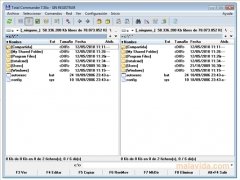

This is why it offers handy shortcuts for common tasks like viewing, editing, copying, moving or deleting files. Like we said before, Total Commander is intended to be used mainly with your keyboard. Another great tool I found to be especially interesting is one that allows you to control, manage and edit file associations so they're not suddenly messed up by a program that you just installed. It includes extra integrated applications like an FTP client, a ZIP viewer, a renaming tool, a disk space analyzer and a file synchronizer. But Total Commander has other aces up its sleeve. The double pane in Total Commander allows you to perform file management tasks like moving and copying in a much more comfortable way. It does, however, support three possible views (Full, Brief and Tree) and also uses a double-pane interface, which seem to be quite a common characteristic among other alternative file managers. Therefore if you want the same behaviour for double-click as you do for Explore here.Total Commander doesn't have what we could describe as an eye-catching design. For many shell items this often the open verb. If you double-click on an item FileLocator Pro executes the 'default verb' for the item. For example, on my Win 7 圆4 system there is a string value DelegateExecute which needed renaming to OLDDelegateExecute for the redirection to work.

If there are any other values under the command key you may need to remove or rename them. something like: "C:\PathToTotalCommander\TotalCommander.exe" /O "%1" Then change the default value (labelled (Default) in regedit) to be the command you want to execute, e.g. Run regedit and find the key: HKEY_CLASSES_ROOT\Folder\shell\explore\command

To have a different application open you need to change the registry. from the context menu FileLocator Pro executes the shell command explore on the folder, ie it doesn't specifically launch Explorer.


 0 kommentar(er)
0 kommentar(er)
